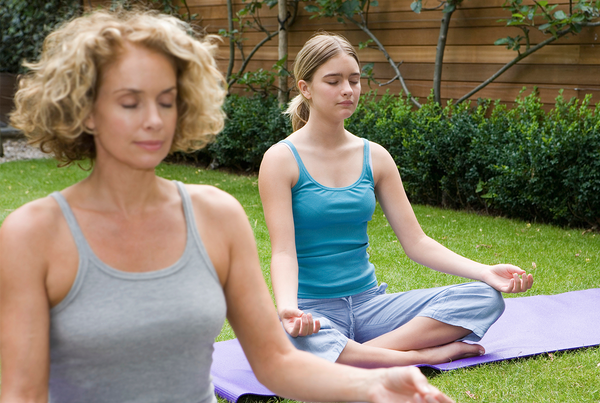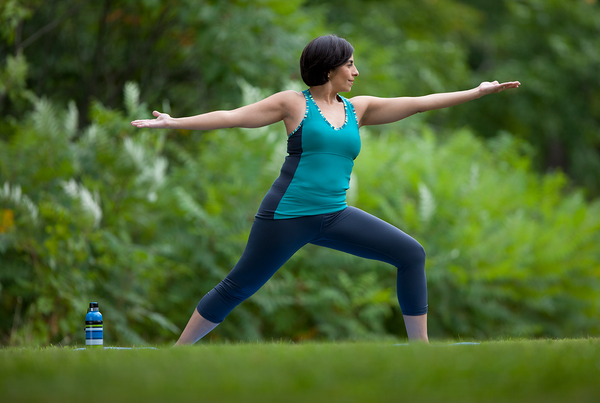In today's fast-paced world, it's so easy to get overwhelmed in the hustle of everyday life, often neglecting our own well-being in the process. With constant distractions all around us, self-care is more important than ever. From meditation to cutting back screen time, these simple, yet power habits can lead to some seriously life-changing results.
1. Morning Meditation
Meditation is a practice that has been used for centuries to promote relaxation and reduce stress. Modern science has also shown that meditation can have significant benefits for both physical and mental health. For example, some studies suggest that incorporating mindfulness meditation practices benefit sleep quality. Other studies have shown that meditation apps reduce stress and improve mindfulness and self-compassion. While more research is needed, it’s a great start, showing promise in this area of health.

Here's how to get started:
- Find a quiet and comfortable place to sit or lie down
- Close your eyes and focus on your breath
- As thoughts come into your mind, simply acknowledge them and let them go
- Start with just a few minutes a day and gradually increase your time
Quieting your mind is no easy task, so be patient with your process. As long as you stay consistent, your practice will improve!
2. Destressing With Yoga
Yoga is a physical practice that combines movement, mindfulness and breathing techniques. Yoga can be done from the comfort of your own home with helpful videos you can find online (making it cost-effective too!) If you’re new to yoga, consider these tips to get started:

- Start with beginner-friendly poses, like cat-cow or downward dog, and gradually build up to more challenging ones
- Attend a yoga class or use a guided video to learn proper form and technique
- Aim for at least 10 to 15 minutes of yoga daily to make it a routine practice
Much like meditation, yoga is a practice that takes years to master. So, don’t get discouraged if it doesn’t come naturally at first. Namaste!
3. Prioritizing Time To Eat Properly
Eating a healthy, balanced diet is crucial for overall health and well-being. The Dietary Guidelines for Americans 2020-2025 recommends eating a diet rich in fruits, vegetables, whole grains, and lean proteins due to their abundant health benefits. Follow these steps to get the most out of your mealtime:

- Prep your meals in advance to ensure that you have healthy options available for the week
- Make time to sit down and eat your meals, rather than eating on the go
- Focus on including a fruit or vegetable at each meal, alongside a protein and/or fat to help with satiety
- When you’re following a ketogenic diet, always keep some quality keto*-friendly snacks on hand so you’re prepared if hunger strikes
4. Staying Hydrated
Drinking enough water is essential for maintaining optimal health and well-being. While drinking enough water is certainly helpful to maintain proper hydration, it’s not the only factor you have to consider. Dehydration can also result from travel, alcohol consumption, and not logging enough zzz’s and may lead to a multitude of health issues, from headaches and fatigue to more serious conditions. Staying on top of your hydration is thus crucial to maintaining your health. Here are some tips to help you drink a little more H20:
- Aim to drink at least 1 cup of water each morning before you get your coffee fix
- Carry a reusable water bottle with you and sip on it throughout the day
- Experiment with adding lemon or cucumber slices to your water for added flavor
5. Avoid Excessive Screen Time
Spending too much time in front of screens can have negative effects on both physical and mental health. Research has shown that excessive screen time can effect sleep quality, leading to disrupted sleep cycles and to you potentially not getting the recommended hours of zzz’s you should be. Plus, logging more hours on your phone to scroll social media has shown to have negative effects, including a higher risk of depression. Here are some tips for reducing your screen time:
- Set strict limits on your screen time, such as no more than 3-4 hours per day and no screens an hour before bed
- Try wearing blue light-blocking glasses to help reduce eye strain felt from excessive screen time
- Take breaks and stretch your legs every hour or so if you work on the computer all day
- Engage in other activities, such as reading or spending time outdoors, to break up your screen time
Be Your Best Self
They say your habits will determine your future. So, if you’d like to reduce stress, improve your overall well-being, and maybe feel a little more energized and productive in the process, start prioritizing your self-care habits. You only have one life. Live it to the fullest!
*Always consult your physician before starting an eating plan that involves regular consumption of high fat foods.






